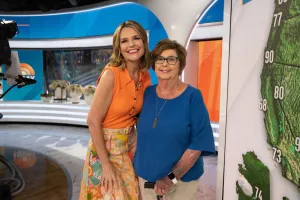With scammers and fraudsters looking to exploit the coronavirus pandemic in order to make money, the U.S. government is warning consumers to be wary of phone calls and text message offers promising everything from testing kits and services to fake charities soliciting fake charities.
Friday, the Federal Communications Commission launched a COVID-19 Consumer Warnings and Safety Tips website after learning of a “proliferation of scam phone calls and texts” related to the coronavirus outbreak.
Videos by PopCulture.com
Keep scrolling to read about some of the top hoaxes being spread and read some of the actual calls and texts in circulation.
Home Testing Kits

A number of text message and robocall scams have surfaced amid limited testing concerns promising offers to be tested for the coronavirus either through a home testing kit or at a testing site.
One actual phone call the FCC has spotlighted as fraudulent begins, “The Coronavirus Response Act has made coronavirus testing more accessible immediately. If you want to receive a free testing kit delivered overnight to your home, press 1. If you do not want your free testing, press 2.”
The FCC advises you do not click on links in texts related to the virus, and check cdc.gov/coronavirus for the most current information.
Social Security Scam
Other scam calls purport to be from the Social Security Administration, threatening to take away benefits from vulnerable recipients amid the pandemic.
“Hello this is a call from the Social Security Administration,” one call targeted by the FCC begins. “During these difficult times of the coronavirus, we regret to inform you that we have got an order to suspend your socials immediately within 24 hours due to suspicious and fraudulent activities found on your socials. We are contacting you as this case is critical and needs your urgent attention. To get more information about this case please call immediately on our department number 888-991-XXXX. I repeat 888-991-XXXX.”
The FCC recommends no one give their personal or financial information over the phone and be wary of people pressuring them to take immediate action.
Mandatory Lockdown

Another scam being spread by text message includes rumors of a national mandatory quarantine, often claiming to be from a neighbor.
“Just received this…from good friend of mine who works for the CDC,” a sample text shared by the FCC reads. “Please be advised, within 48 to 72 hours the president will evoke what is called the Stafford Act. Just got off the phone with some of my military friends up in DC who just got out of a two hour briefing. The president will order a two week mandatory quarantine for the nation. Stock up on whatever you guys need to make sure you have a two week supply of everything. Please forward to your network.”
The National Security Council has also confirmed these texts are fake.
Text message rumors of a national #quarantine are FAKE. There is no national lockdown. @CDCgov has and will continue to post the latest guidance on #COVID19. #coronavirus
— NSC (@WHNSC) March 16, 2020
Donation Requests
Amid the national emergency, there are plenty of scammers looking to pose as charities in order to extort money from their victims. The FCC is warning people to be wary of phone calls and text messages claiming WHO or charity organizations asking for account information or for money.
The FCC advises people check on a charity before donating by checking out its verified website or calling the organization at its listed number.
Fake Cures

There are also scams circulating from sources claiming to have found cures to COVID-19 or vaccines for the coronavirus in exchange for credit card information or Medicare information.
“Two ingredients of a good scam are fear and confusion, and we have both of those right now,” Adam Garber, consumer watchdog at U.S. PIRG, a federation of public interest research groups told NBC. “So, it’s a playground for people who want to take advantage of others.”
HVAC Duct Cleaning
Robocalls looking to scam people out of money are also offering HVAC duct cleaning as a way to “protect” your home and family from the virus.
The FCC advises that in general, unknown numbers — especially from your home area code — are reason to be cautious. The best practice is to let those calls go to voicemail and call back if necessary. Local businesses and medical professionals calling to remind you of an appointment or of test results will make that clear in the call.
Government Checks

The FCC finally warned consumers of scam calls and texts asking for personal information and bank account details in order to obtain government-issued checks or relief funds.
“If that happens, no one will call or text you to verify your personal information or bank account details in order to ‘release’ the funds,” the FCC warns.
Photo credit: Jeff J Mitchell/Getty Images
Most Viewed
-

Beverly Hills, CA – January 31, 2026: Jelly Roll, left, and Bunnie Xo, right, pose for portraits on the red carpet during the 68th GRAMMY Awards Pre-GRAMMY Gala & GRAMMY Salute to Industry Icons Honoring Avery Lipman & Monte Lipman at the Beverly Hilton on Saturday, Jan. 31, 2026 in Beverly Hills, CA. Clive Davis’ annual pre-Grammy party hosts an array of A-listers from entertainment, sports, and politics to come together and enjoy performances. (Kayla Bartkowski/ Los Angeles Times)







